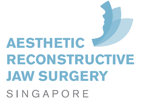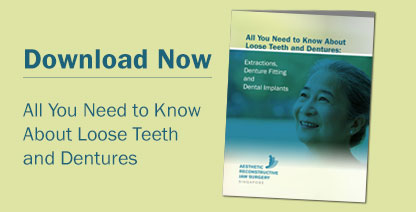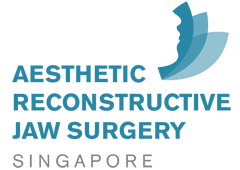Share this
Dental Bridge, Dental Implants or Dentures: What Works Best For You?
on February 25, 2014
 If you're a Singapore dental patient who is in need of dental restoration now or soon will be due to missing teeth, you're probably already aware that there are a number of options available if you for replacing missing teeth. Which is the best one? Since every patient is different, the answer to that question depends upon your personal circumstances. Knowing how each option works and their advantages and disadvantages can make it easier to find which of them will work best for you.
If you're a Singapore dental patient who is in need of dental restoration now or soon will be due to missing teeth, you're probably already aware that there are a number of options available if you for replacing missing teeth. Which is the best one? Since every patient is different, the answer to that question depends upon your personal circumstances. Knowing how each option works and their advantages and disadvantages can make it easier to find which of them will work best for you.
Dental Bridge
A fixed dental bridge is a dental appliance that can be used to replace a single missing tooth or a span of several. The most common type of dental bridge consists of one or more artificial teeth placed between two crowns, which will be fitted onto natural teeth at either end of the gap left by tooth loss to hold the bridge in place.
The chief advantage of this dental restoration is speed, since they can be made and placed quickly. Disadvantages include the need to crown natural teeth, since this involves reshaping the teeth, a process that can make them more vulnerable to decay. The stress placed on those natural teeth as they support the bridge can cause damage as well, and when supporting teeth are weakened or damaged, bridges can fail. Additionally, dental bridges loosen over time due to bone loss in the jaw. These factors make replacement necessary periodically, with the average bridge lasting seven to ten years.
Dentures
Partial dentures can replace one missing tooth or several, and generally consist of the required number of artificial teeth placed onto a gum-colored base. They are typically retained by clasps at each end that fit onto adjacent natural teeth. Full dentures are used to resolve total tooth loss in one or both jaws and are fitted to the contours of the mouth, resting on the gum ridge for support.
The chief advantages of dentures are quick restorations and fairly low upfront costs. Disadvantages include bone loss, damage to supporting teeth with use of partial dentures, and the need to reline or replace them every few years as the gum ridge and underlying bone shrinks. Poor retention is a common problem, especially in lower dentures, and can cause discomfort, and pain, as well as difficulties with biting, chewing and speech.
Dental Implants
Dental implants can be used in restorations that replace a single tooth, several teeth or all teeth. In single tooth replacement, a titanium post – the dental implant – is surgically placed into the jawbone to serve as an artificial tooth root. After a healing period to allow the implant to bond with the jawbone, an abutment will be mounted to the implant to hold a crown. For the replacement of several teeth, an implant-supported bridge can be used, with two or more implants placed to secure a permanent bridge. Total tooth replacement is done by placing four to eight implants in each jaw to hold a full set of replacement teeth.
Dental implants, as your Singapore oral surgeon or dentist has probably told you, are the treatment of choice for tooth loss. Advantages include protection against bone loss in the jaw, since the implants stimulate the body's bone maintenance process in the same way natural tooth roots do. They look, feel and function like natural teeth, and they are the option with the greatest longevity, since dental implants have an average lifespan of 25 years. The chief disadvantage is that dental implant restoration typically takes a bit longer than other restorative options.
Share this
- Jaw Surgery (93)
- Dental Implants Singapore (90)
- Orthognathic Surgery (48)
- Replacing Missing Teeth (26)
- Missing Teeth Options (23)
- Underbite (23)
- Bone Grafting (21)
- Costs (18)
- Facial Aesthetics (18)
- Aesthetics (17)
- dental implants (16)
- corrective jaw surgery (15)
- BOTOX (11)
- Dermal Fillers (11)
- Wisdom teeth (10)
- Fixed Implant Dentures (8)
- Loose Dentures Singapore (6)
- Medisave (6)
- sleep apnea (6)
- Braces (5)
- Dental Pain (5)
- Dentures in Singapore (5)
- Loose Teeth (5)
- Tooth Extraction (5)
- jaw deformities (5)
- bimax (4)
- bone graft (4)
- maxillomandibular advancement (4)
- all-on-4 (3)
- bimaxillary protrusion (3)
- chin implant (3)
- facial asymmetry (3)
- full mouth dental implants (3)
- genioplasty (3)
- immediate implant (3)
- removal of an integrated dental implant (3)
- third molars (3)
- wisdom tooth surgery (3)
- My Dentures Don't Fit (2)
- VME (2)
- bone graft healing (2)
- distraction osteogenesis (2)
- medical tourism (2)
- obstructive sleep apnea (2)
- orthodontics (2)
- plastic surgery (2)
- CT guided dental implants (1)
- Double jaw surgery (1)
- Invisalign (1)
- Periodontal Disease (1)
- Permanent Dentures Singapore (1)
- before and after photos (1)
- facial trauma (1)
- fractured dental implant (1)
- oral appliance therapy (1)
- root canal treatment (1)
- veneers (1)
- vertical maxillary excess (1)
- September 2019 (2)
- July 2019 (2)
- May 2019 (2)
- August 2018 (1)
- October 2017 (1)
- September 2017 (2)
- August 2017 (1)
- June 2017 (2)
- May 2017 (4)
- April 2017 (1)
- March 2017 (1)
- February 2017 (3)
- January 2017 (3)
- December 2016 (1)
- November 2016 (2)
- October 2016 (4)
- September 2016 (9)
- August 2016 (5)
- July 2016 (11)
- June 2016 (14)
- May 2016 (6)
- April 2016 (2)
- March 2016 (1)
- January 2016 (7)
- December 2015 (10)
- November 2015 (4)
- October 2015 (9)
- September 2015 (7)
- August 2015 (1)
- July 2015 (6)
- June 2015 (3)
- May 2015 (7)
- April 2015 (5)
- March 2015 (8)
- January 2015 (5)
- December 2014 (7)
- November 2014 (7)
- October 2014 (6)
- September 2014 (8)
- August 2014 (5)
- July 2014 (7)
- June 2014 (8)
- May 2014 (9)
- April 2014 (10)
- March 2014 (6)
- February 2014 (8)
- January 2014 (3)
Subscribe by email
Email subscription




No Comments Yet
Let us know what you think